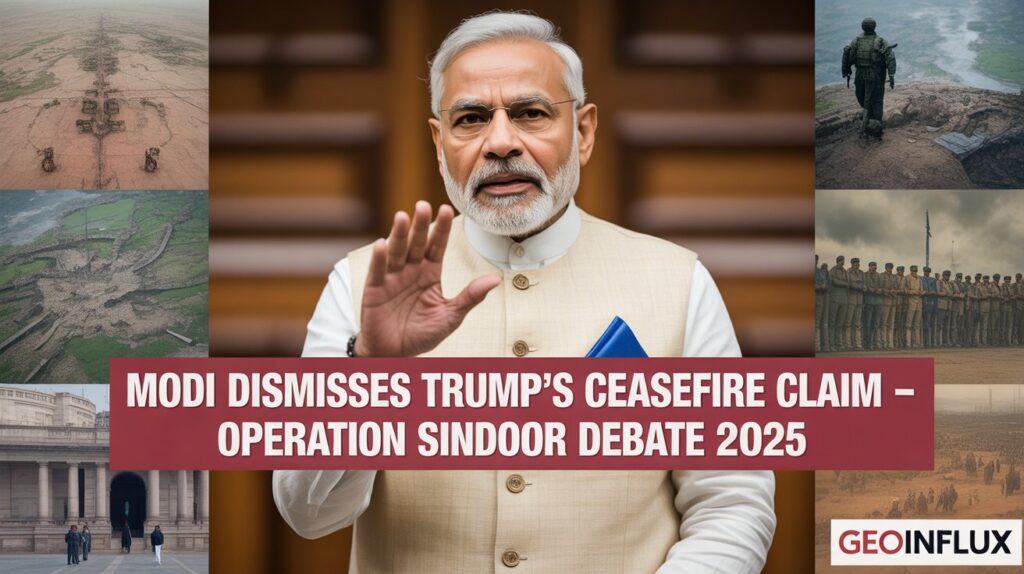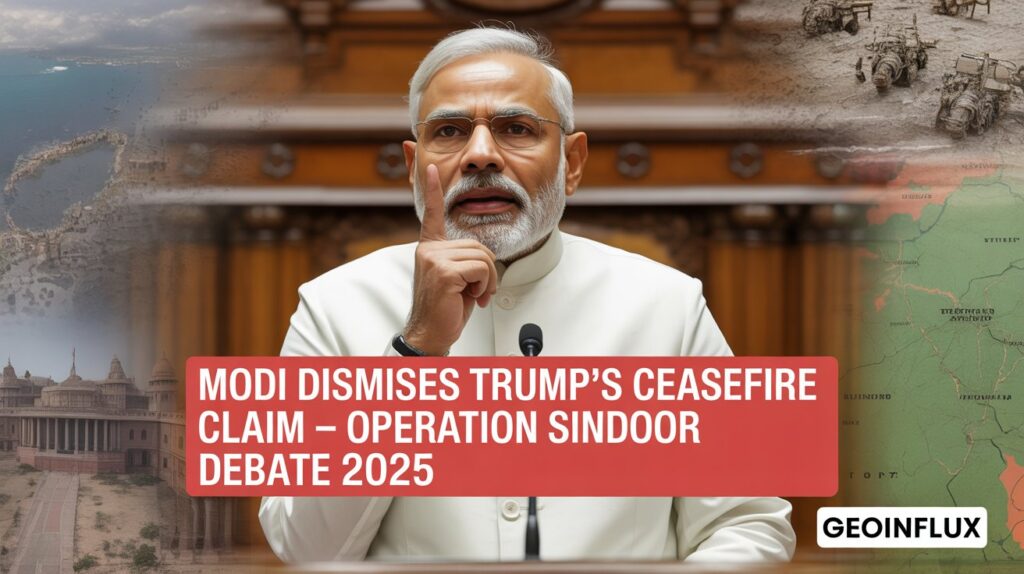Modi slams Trump’s ceasefire claim in Parliament over Operation Sindoor, sparking fierce debate on U.S.–Pakistan ties, Indus Water Treaty, and India’s evolving foreign policy. Discover how India is reshaping its geopolitical strategy.
A fiery debate in India’s Parliament has disrupted global diplomatic discourse, centering on Operation Sindoor — a bold Indian military strike — and the escalating war of words between Prime Minister Narendra Modi and Leader of Opposition Rahul Gandhi.
As lawmakers clashed, historic treaties, national security doctrines, and the fragility of India–U.S. relations took centre stage, with implications reverberating far beyond South Asia.
🗂️ Operation Sindoor and Trump’s Controversial Ceasefire Claims
In a dramatic parliamentary session, Prime Minister Narendra Modi strongly denied Trump’s oft-repeated claims—over 25 times, reportedly 29—that he prevented a full-blown India–Pakistan war.
Modi’s detailed timeline of Op Sindoor and his rebuttal of the American media’s silence added new urgency to questions around international accountability, counter-terrorism diplomacy, and national sovereignty.
🏛️ Background: Operation Sindoor and the Pulwama-Pahalgam Nexus
Launched in response to terror attacks like the Pahalgam massacre, Op Sindoor was designed to neutralise Pakistani-sponsored militant networks.
The operation intensified after revelations that the terrorists killed in Operation Mahadev were directly linked to the massacre. India’s assertive posture has since triggered a wave of political and strategic discourse.
🏛️ Modi’s Decisive Rebuttal: “No World Leader Asked Us to Stop”
During the fiery debate, PM Modi made it unequivocal: “No world leader asked us to halt Op Sindoor.” This directly undercuts Donald Trump’s repeated assertions that he played peacemaker between India and Pakistan.
“If Pakistan attacks, we will respond with cannon fire.” – PM Modi
Modi shared a gripping detail—on the night of the 9th, U.S. Vice President J.D. Vance tried repeatedly to contact him.
After finally connecting, Vance warned of a possible Pakistani offensive. Modi’s response was unflinching: “It will cost them dearly.” By morning of the 10th, India had reportedly “annihilated Pakistan’s military power.”
✅ FAQ: Did PM Modi Accuse Trump of Lying?
No, but he categorically refuted Trump’s mediation claims. The opposition, however, urged him to say so explicitly.

🧾 Rahul Gandhi’s Counterattack: Truth, Terror, and Accusation
The debate turned volatile as Rahul Gandhi demanded Modi take a bold public stance:
“If he has the courage of Indira Gandhi, let him say here that Donald Trump lied!”
Gandhi emphasised that Trump’s repeated assertions had “damaged India–U.S. relations”, causing lasting diplomatic discomfort.
He also warned that Trump’s expected visit to India for the QUAD Summit could be diplomatically awkward given these contradictions.
💧 Indus Water Treaty Under Fire: Modi Calls It “A Historic Blunder”
Shifting gears, PM Modi criticised Jawaharlal Nehru for signing the Indus Water Treaty, labelling it “a big blunder”.
He questioned why 80% of the water from rivers flowing through India was allocated to Pakistan, stating:
“That water belongs to our farmers in Punjab and Haryana.”
This revival of a decades-old issue signals a potential foreign policy shift and reassertion of India’s water rights.
✅ FAQ: What Is the Indus Water Treaty?
A 1960 agreement brokered by the World Bank that divides water from six rivers between India and Pakistan, with 80% allocated to Pakistan.
🎯 U.S.–Pakistan Paradox: Talking Terror While Aiding the Military
Pakistan’s Counter-Terrorism Irony: U.S. Hosts Gen. Asim Munir: Rahul Gandhi further challenged India’s diplomatic strategy by exposing the hypocrisy in U.S. counter-terrorism policy.
While India brands Pakistan as a terror sponsor, General Asim Munir, Pakistan’s Army Chief, was seen at a U.S.-led counter-terrorism summit alongside General Michael Kurilla (CENTCOM).
“They say Pakistan fosters terrorism, and then have lunch with the same guy to fight terrorism?” – Rahul Gandhi
This raises serious questions about the alignment between India and the U.S. counter-terror strategies.
🌐 Geopolitical Implications: India’s Diplomatic Tightrope
The Op Sindoor debate isn’t just about domestic politics—it’s about:
- India’s growing assertiveness in foreign policy
- Re-evaluating outdated treaties like the Indus Water Treaty
- Managing a volatile equation with the U.S. amid Trump’s unpredictability
With India–U.S. trade talks ongoing and Trump a wildcard in global affairs, Modi’s diplomatic choices could shape the next decade of bilateral ties.
✅ Conclusion & Key Takeaways
- PM Modi firmly refuted Donald Trump’s ceasefire claims.
- Op Sindoor was a decisive Indian military response, not mediated by any foreign power.
- The Indus Water Treaty is under scrutiny as India reclaims strategic water rights.
- The U.S.’s engagement with Pakistan’s military raises tough questions about counter-terrorism credibility.
- Rahul Gandhi’s challenge put pressure on Modi to publicly confront misinformation on the world stage.
India’s democracy, once again, proves its strength through vigorous debate and strategic clarity.
📊 Summary Table
| Topic | Key Highlights |
|---|---|
| Operation Sindoor | India retaliated strongly against Pakistan-backed attacks |
| Trump’s Ceasefire Claims | PM Modi refuted all mediation allegations |
| US–India Relations | Strained due to Trump’s narrative |
| Indus Water Treaty | U.S. engagement with Gen. Asim Munir criticised |
| Pakistan & Terrorism | Marked by fierce challenges from the opposition, especially Rahul Gandhi |
| Parliament Debate | Marked by fierce challenges from opposition, especially Rahul Gandhi |
❓ FAQs
Q1: What is Op Sindoor?
A military operation launched by India to neutralise terrorist threats from Pakistan, especially after the Pahalgam massacre.
Q2: Did Trump stop a war between India and Pakistan?
PM Modi has denied any such intervention, saying India acted independently.
Q3: What is the controversy about the Indus Water Treaty?
India’s PM called it a “historical blunder” for giving Pakistan access to 80% of the river waters.
Q4: Why is Rahul Gandhi targeting Trump?
He believes Trump’s false claims have harmed India–U.S. relations and wants PM Modi to refute him directly.
Q5: What is the U.S. role in counter-terrorism with Pakistan?
Critics point to the contradiction of the U.S. inviting Pakistan’s Army Chief to anti-terror summits.
🔗 Related Articles from GeoInflux
- TRF Terrorist Designation: India Scores Big Win as US Blacklists Pakistan-Backed Group
- India–Russia Trade in a Sanctioned World: 5 Strategic Energy Deals That Are Redefining Ties
- Donald Trump’s India-Pakistan War Claims Resurface Amidst Mounting Domestic Pressure
📚 References
- India Parliament Proceedings – Lok Sabha TV
- Trump’s Ceasefire Claims – CNN Archive
- Indus Water Treaty Background – World Bank
- U.S. CENTCOM on General Munir Visit
- Modi’s Statement on Operation Sindoor – Hindustan Times
Thank You for Reading
We sincerely appreciate your time and interest in exploring the intricate layers of global geopolitics with us. At GeoInflux, our mission is to decode complex world affairs and deliver sharp, insightful analysis that empowers readers like you.
If you found this article valuable, please consider sharing it with others, subscribing to updates, or joining the conversation on our Telegram and Twitter/X communities.
Your support fuels independent geopolitical journalism.





Pingback: Trump Tsunami Warning Shocks World After 8.8 Earthquake in Russia: Pacific Ring of Fire on Edge - GeoInflux
I saw a lot of website but I think this one contains something extra in it in it
Merely wanna comment on few general things, The website pattern is perfect, the content is very superb. “The idea of God is the sole wrong for which I cannot forgive mankind.” by Marquis de Sade.